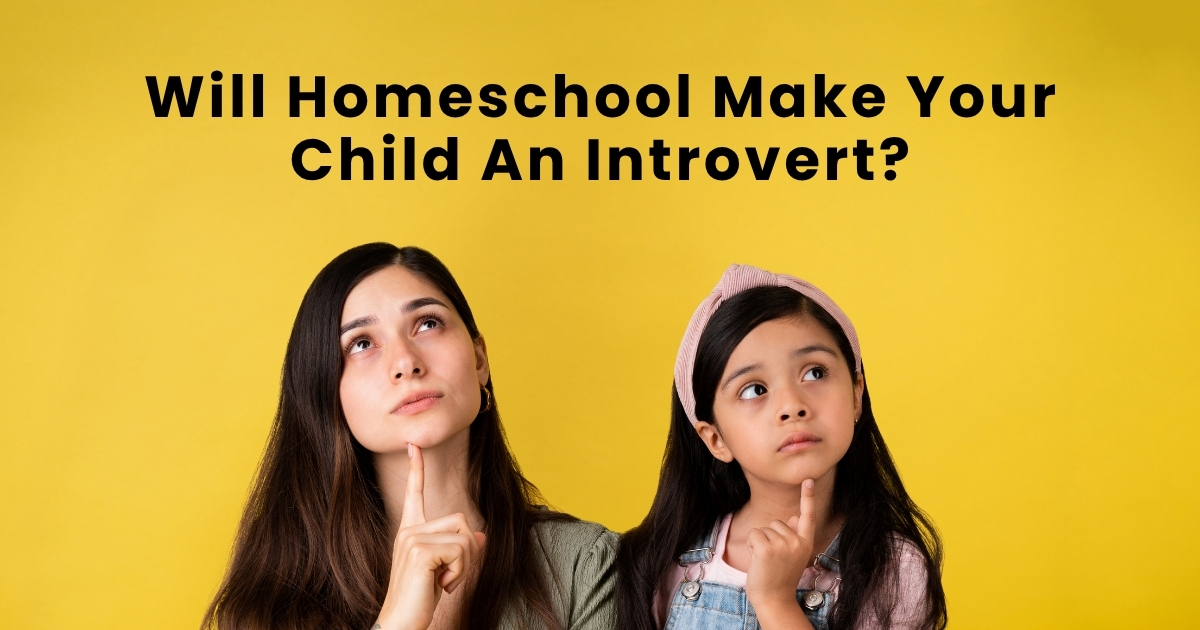When parents consider homeschooling, a common concern is whether it might hinder their child’s social development or make them more introverted. This question often stems from the assumption that homeschoolers lack social interaction compared to children in traditional schools. While it’s true that homeschooling creates a different social dynamic, it doesn’t inherently lead to introversion or poor social skills. Instead, homeschooling offers opportunities to tailor social experiences and nurture skills that might be harder to develop in a conventional setting.
Here, we’ll explore how homeschooling and socialization intertwine, address concerns regarding introverted homeschoolers, and provide actionable strategies to ensure your child thrives both socially and emotionally.
Understanding Introversion And Homeschooling
Introversion is a personality trait, not a condition determined by homeschooling. Some kids are naturally more introverted regardless of their educational environment, while others lean toward extroversion. For introverted children, homeschooling can be a blessing, creating a supportive environment that respects their need for quieter, less overstimulating interactions.
Benefits of Homeschooling for Introverted Children
Homeschooling can align with an introvert’s personality in several ways, offering meaningful advantages:
- Controlled social environments: Homeschooling allows introverts to engage in small, calm social settings tailored to their preferences instead of navigating the high-energy chaos of traditional classrooms.
- Ample downtime: Kids with introverted tendencies often need solitude to recharge. Homeschooling gives them the flexibility to balance social interactions with alone time.
- Deep relationships: Introverted children may thrive in homeschool settings where they can foster meaningful, one-on-one connections rather than the superficial interactions common in busy school hallways.
- Structured socialization: Parents can carefully choose activities, clubs, or groups that align with their child’s interests and comfort levels, ensuring social encounters are positive and enriching.
Identifying Your Child’s Needs
If your child leans toward introversion, it’s crucial to acknowledge and respect their unique social needs. While some children crave constant interaction, introverts may prefer fewer but richer connections. By recognizing this distinction early, you’ll be better equipped to provide appropriate opportunities for social growth without overwhelming them.

Socialization Opportunities In Homeschooling
One of the biggest myths about homeschooling is that homeschoolers don’t interact with peers. The reality is that homeschooled children have just as many opportunities to develop social skills as their traditionally schooled peers—sometimes even more so because they often experience diverse social settings. Here’s how to ensure your child builds strong social connections through homeschooling:
Community-Based Activities
Being homeschooled doesn’t mean existing in isolation. Many communities have robust resources designed specifically for homeschoolers. Explore the following options:
- Local homeschool groups: Many areas have support groups where families meet regularly for field trips, park days, or cooperative learning experiences.
- Library programs: Public libraries often host workshops, story hours, or STEM classes that appeal to children of various ages.
- Sports and recreation activities: Non-school-sponsored sports leagues or recreational classes (like gymnastics or dance) can provide fun, team-based interaction without the rigidity of school sports.
- Volunteering: Activities like helping at animal shelters, community gardens, or food banks not only teach social responsibility but also offer opportunities to meet others.
Extracurricular Classes
Homeschoolers can develop skills while forming friendships through extracurricular classes outside the home. Common examples include:
- Art and music lessons
- Language classes
- Coding workshops
- Drama/theater groups
These programs often bring kids from different educational backgrounds together, offering fresh perspectives and diverse social interactions.
Online Communities
For tech-savvy homeschooled children, virtual connections can play a significant role in expanding their social circle. Look into monitored, child-friendly platforms where they can safely interact with peers. Examples include homeschooling forums, collaborative educational projects, or moderated online role-playing games.
Playdates and One-on-One Friendships
Some kids thrive in smaller settings, making personally arranged playdates an excellent way to nurture friendships. Family friends, neighbors, or fellow homeschoolers are perfect candidates for casual meetups. These personalized interactions can be ideal for kids who find larger groups overwhelming.
Family-Organized Events
Parents can even take the lead in fostering social connections by hosting events like:
- Potlucks with fellow homeschooling families
- Game nights
- Science fairs or history presentations
- Book clubs or study groups
These activities encourage collaboration while giving parents more control over the environment.
Understanding Social Skills Beyond Peer Interaction
School isn’t the only place kids can learn how to interact socially. Many aspects of social development occur outside the classroom, often through interactions with family, neighbors, mentors, and community members. Consider the broader definition of socialization and how homeschooling supports it:
Building Key Social Skills at Home
- Communication: Through everyday interactions with parents and siblings, homeschoolers develop strong interpersonal skills, such as speaking clearly and resolving conflicts.
- Empathy: Tightly-knit homeschool families often create a foundation for understanding and relating to others’ feelings. Modeling respect and kindness at home encourages these traits.
- Adaptability: Homeschoolers often engage with people of various ages in a range of settings, helping them feel comfortable with adults as well as peers. This early exposure builds confidence and flexibility in new situations.
For example, attending a local farmers’ market might teach your child how to converse respectfully with vendors, ask thoughtful questions, and practice basic etiquette. These skills transfer seamlessly to broader social contexts later in life.
Combating Stereotypes
It’s important to address the misconception that homeschooled children are socially inept. Research consistently shows that homeschoolers are just as socially adept and emotionally resilient as their school-going peers. The key difference is that their social experiences are more customized and varied. For introverted homeschoolers especially, this approach empowers them to thrive in ways that align with their natural temperament.
Addressing Social Concerns Proactively
If you’re still worried about your child’s social development as a homeschooler, there are proactive strategies you can implement to ease those concerns and foster growth.
Create a Socialization Plan
Developing a structured approach to social interactions can ensure your child gains consistent exposure to different environments and people. Here’s how to craft an effective plan:
- Set goals: Identify specific skills you’d like your child to develop, such as teamwork or public speaking.
- Choose activities: Match your goals with appropriate activities like debate clubs, scouting, or sports teams.
- Block time for socializing: Incorporate weekly or monthly social activities into your homeschool schedule to make sure connections stay consistent.
- Evaluate progress: Regularly check in with your child to discuss what they enjoy, dislike, or wish to change about their social experiences.
Encourage Diverse Friend Groups
While many homeschoolers spend time with other homeschoolers, diversifying their social circle is equally important. Seek opportunities for your child to meet children who attend traditional schools or those in different community groups. Diversity in their peer group exposes them to new perspectives and experiences.
Promote Independence
Sometimes, teaching socialization means giving your child the freedom to take the lead. Encourage them to make decisions, solve interpersonal conflicts, or plan events like group projects. These real-world experiences prepare them for independence and adulthood.
Creating An Environment Full Of Opportunities
Homeschooling doesn’t create introverts, nor does it leave kids socially unprepared. Whether your child is naturally introverted or extroverted, homeschooling provides a unique platform to cater to their social, emotional, and academic needs simultaneously. By leveraging the flexibility homeschooling offers, parents can create an environment ripe with opportunities for personal growth and meaningful social connections.
Socialization in homeschooling is what you make of it. By being intentional about providing diverse experiences and fostering key skills, you can raise a confident, well-adjusted child who’s comfortable navigating both small circles and larger worlds.





